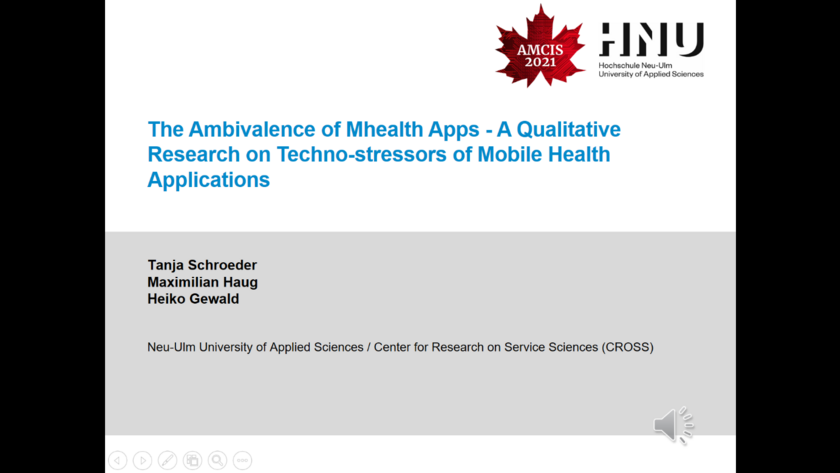
The Academy of Management (AOM) had more than 9500 attendees at its virtual conference this year from July 29 to August 4 – among them Axel Hund (opens in a new window), research associate for the research area "Deployment of Innovative Technologies in Emerging Markets" at HNU. He represented CROSS (opens in a new window) with the paper "Balancing Organizational Identity through Mission Statements: A Topic Modeling Analysis." Axel Hund, Heinrich Graser, Heinz-Theo Wagner, Daniel Beimborn and Tim Weitzel researched how companies in the environment of digital innovation shape their organizational identity and communicate it through mission statements. They were able to show that mission statements address up to 18 different topic areas and that companies that focus on digital innovation only target certain combinations of these topic areas. This allows them to communicate their organizational identity and differentiate them from other companies.
One of the most important business information systems conferences in the Asia region is the Pacific Asia Conference on Information Systems (PACIS). The internationally networked Institute for Service Management presented two papers at this conference again this year.
The paper by Sina Zimmermann (opens in a new window), Andreas Hein, Thomas Schulz (opens in a new window), Heiko Gewald (opens in a new window), and Helmut Krcmar entitled "Digital Nudging Toward Pro-Environmental Behavior: A Literature Review" is based on a structured literature review. It shows how digital nudging – a behavior change method – can promote sustainable behavior. Sina Zimmermann, research associate at HNU, told us more about her research in an interview.
Digital nudging: pushing toward more sustainable behavior
What exactly is digital nudging? And where do we encounter it in everyday life?
Nudging means "to nudge" and is a method of influencing human behavior without changing the economic incentives. A well-known example would be the arrangement of different dishes in the cafeteria: By placing the healthier dishes further forward, for example, you can encourage more people to choose a healthy dish without having to offer the dish at a lower price or ban unhealthy variants.Digital nudging then transfers this concept to the digital space; it is used on websites or in apps, for example. Digital nudging is, for example, when mobility apps highlight climate-friendly route alternatives, such as the bicycle route, in color or encourage the choice of such an alternative with a positive comment.
Are you planning further research in this area?
Yes, we are currently working on a further research paper that we would like to place in a trade journal. This will focus primarily on fundamental aspects of digital nudging that arise from the digital application space.
Why are you involved in digital nudging? What is your personal research interest here?
Digital nudging offers an interesting perspective for influencing people in decisions that are often difficult to implement in everyday life. This applies, for example, to the areas of health, nutrition or climate protection. I'm looking in detail at how people can be "nudged" to move more sustainably - to choose cycling or public transport instead of the car, for example. Personally, I believe that this is an important aspect of combating the climate crisis, one that takes advantage of the opportunities offered by digitization and thus reaches younger people in particular.
How did you experience the conference and your presentation, especially compared to "pre-corona meetings"?
Even if online conferences cannot replace "pre-corona conferences", this alternative has helped to maintain the exchange with other scientists over the last year. The technical presentations themselves can be organized very well in the digital space and one can participate more efficiently in the individual slots. However, the impulses and experiences outside of the lectures are missing, which are also very valuable and often lead to new contacts. In any case, I hope that the next conference, which is planned for December in the USA, can take place again in a present setting and that we from Europe will be able to travel there again by then.
Sina Zimmermann (opens in a new window) is a research associate in the field of digitization of mid-sized companies and works at the Center for Research on Service Sciences (CROSS) (opens in a new window) at HNU.

Tanja Schröder contributed the article "A Conceptual Framework for a Digital Health Innovation Ecosystem." In their research, Tanja Schröder (opens in a new window), Thomas Schulz (opens in a new window), Maximilian Haug (opens in a new window), and Heiko Gewald (opens in a new window) examined the experiences and needs of physicians in long-term integration opportunities of health apps against the background of prescription smartphone apps in Germany. It emerged that there is a significant need for optimized information sources, effective data preparation, and improved communication between technological components within a digital health ecosystem.
The Americas Conference on Information Systems (AMCIS) is a leading information systems conference in the Americas. Not only researchers, but also a large number of practitioners and company representatives meet here to exchange ideas. The Institute of Service Management has been present at AMCIS since the very beginning and contributed again this year via virtual channels.
The article by Sina Zimmermann, Heinz-Theo Wagner, Philipp Rössler, Heiko Gewald, and Helmut Krcmar entitled "The Role of Utilitarian vs. Hedonic Factors for the Adoption of AI-based Smart Speakers" was presented by Sina Zimmermann. The research project investigates which factors influence the adoption and use of smart speakers. For this purpose, a qualitative study was conducted with 19 participants who tested an Amazon Echo Dot over several weeks. The results show that functionalities aimed at the usefulness of smart speakers are more important for acceptance and use than hedonic factors.
Tanja Schröder presented an article in Technostress entitled "The Ambivalence of Mhealth Apps -A Qualitative Research on Techno-stressors of Mobile Health Applications." In this article, the authors Tanja Schröder, Maximilian Haug, and Heiko Gewald found out that technostress in healthcare has been largely neglected so far, with a few exceptions. Using semistructured interviews, four different stress factors were identified. The results suggest that the characteristics of the technology influence the stressors that trigger stress in the user:in.
The fact that scientific exchange did not come to a standstill during this global pandemic, in which physical encounters among researchers were hardly possible, is due in no small part to the technical possibilities offered by our digitized working world. Nevertheless, CROSS is also looking forward to meeting and conferring "in real presence" again soon - and the next stop on the conference agenda will at least take place in a hybrid format: In December, the Institute of Service Management will present at ICIS 2021 (opens in a new window) (International Conference on Information Systems; the most important conference in information systems) in Austin, Texas with three contributions.
Links to all articles:
PACIS
Digital Nudging Toward Pro-Environmental Behavior: A Literature Review (opens in a new window)
A Conceptual Framework for a Digital Health Innovation Ecosystem (opens in a new window)
AMCIS
The Role of Utilitarian vs. Hedonic Factors for the Adoption of AI-based Smart Speakers (opens in a new window)
The Ambivalence of Mhealth Apps -A Qualitative Research on Techno-stressors of Mobile Health Applications (opens in a new window)






